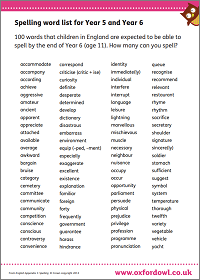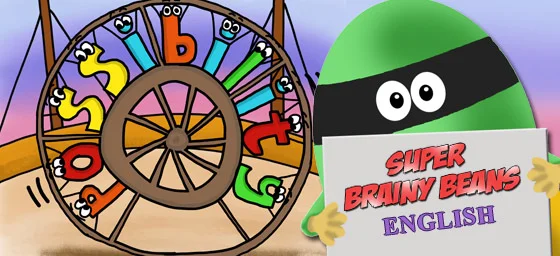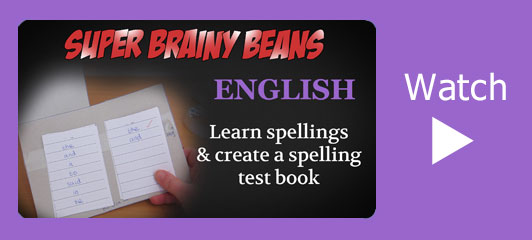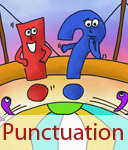

Spelling in Year 5 (age 9–10)
In Year 5, your child will be spelling more complicated words with increased accuracy.
What your child will learn
Using more prefixes and suffixes.
Suffixes are morphemes (groups of letters that mean something on their own) that are added at the end of a root or root word to change the meaning. Prefixes are morphemes added at the front of a word.
In Years 5 and 6, your child will learn about lots of prefixes and suffixes to spell longer words and change the meaning of those words.
Spelling some words with ‘silent’ letters
Some words include letters that were sounded hundreds of years ago but aren’t sounded in modern English. For example, in ‘knight’, there used to be a ‘k’ sound before the ‘n’. Now the pronunciation has changed, but the spelling hasn’t, so the word includes a ‘silent’ letter that cannot be predicted from how the word sounds. Words like this can be very tricky to spell.
In Years 5 and 6, your child will learn some of these words, including:
doubt, island, lamb, solemn, thistle, knight
Knowing the difference between homophones and other confusing words
Homophones are words that are spelled differently and have different meanings, but are pronounced in the same (or almost the same) way. They are often confused in children’s writing. In Years 5 and 6, your child will be taught the difference between:
Aisle/isle, aloud/ allowed, affect/effect, altar/alter, ascent/assent, bridal/ bridle, cereal/serial, compliment/complement, descent/ dissent, desert/dessert, draft/draught, farther/further/father, guessed/guest, heard/herd, led/lead, morning/mourning, past/passed, precede/proceed, principal/principle, profit/prophet, stationary/ stationery, steal/steel, wary/weary, who’s/whose
Using morphology and etymology in spelling
Knowledge of roots words can also help when a word isn’t spelled using the most obvious set of letters to represent the sounds. For example, knowing that that science , conscious , and conscience all share the same Latin root can help us to remember tricky ‘sci’ spellings.
Checking spellings in a dictionary
Using a thesaurus, how to help at home.
There are lots of ways you can help your Year 5 child with spelling. Here are our top ideas.
1. Help with spelling homework
If your child is struggling with a spelling list they have been asked to learn, here are a few ideas to help:
- Remind your child to regularly check through their writing for spelling errors. They need to develop a feel for whether a word looks right. They could underline words they are not sure of and then check with a dictionary.
- Use over-pronunciation. So for Wednesday , encourage children to say Wed-nes-day as they write. There are lots of words which feature sounds that aren’t always pronounced clearly (such as words ending in -ed ), and over-emphasising these while spelling them out can help fix the spelling in your child’s memory.
- Ask your child to write down the words that they need to remember how to spell. The physical act of writing the words by hand helps to anchor the spelling in children’s memories and encourages them to think about the letters that represent the sounds in the word. Typing the words into a PC or tablet isn’t as effective.
- Focus your child’s attention on the tricky bits in a word by asking them to highlight them. For example, show them that said has ‘ai’ in the middle and ask them to write the word, and then highlight or underline this part to help them remember. Few resources are more motivating than a highlighter pen for primary-aged children!
2. Play spelling games
Video playlist: how can i help my child with spag.
Charlotte Raby offers her expert advice for helping your child develop their grammar, punctuation, and spelling skills at home.
For example, your child may have to learn ‘room took hoop foot book’. They could make up a silly sentence such as ‘The boy took his book across the room but got his foot caught in a hoop’. Why not draw illustrations to go with the sentences?
3. Find the right resources
Year 5 & 6 spelling word list.

- Age 5–6 (Year 1)
- Age 6–7 (Year 2)
- Age 7–8 (Year 3)
- Age 8–9 (Year 4)
- Age 9–10 (Year 5)
- Age 10–11 (Year 6)
- Year 1 (age 5–6)
- Year 2 (age 6–7)
- Year 3 (age 7–8)
- Year 4 (age 8–9)
- Year 5 (age 9–10)
- Year 6 (age 10–11)
- Grammar glossary
- Grammar books

Home » Spelling » Year 5
Spelling Year 5

Spelling Year 5 KS2. Support on spelling for kids with Super Brainy Beans. Primary homework help with worksheet downloads and online games.
Pick a level
If you find the spellings difficult in your year then try starting with spellings from the year below. It's ok to work lower than the year you are on and fill the gaps rather than struggling at your level without understanding the basics.
Take the Year 5
Check what your spelling level is with our online test.
Start Year 5 Spelling Test
Download all Year 5 spelling worksheets
Download and print out our spelling worksheets for Year 5. 360 words especially selected for kids in Year 5, KS2.
- Uses the Look, Say, Cover, Write, Check method.
- Covers all the essential words to learn in Year 5.
- Print at home.
Download Year 5 Spelling Worksheets
Learning spellings
Practice your spellings for four days then get someone to test you on the fifth day without looking at the words first.

Spell all 40 common words
Throughout Year 5 children are expected to learn how to spell the 40 new words which are commonly used in reading and writing.

Suffixes ment
Suffixes are groups of letters that can be added to a root word. Suffixes change the meaning of a word to make a new word.
Words ending in ment .
move ment enjoy ment equip ment
Suffixes ity
Words ending in ity .
activ ity abil ity possibil ity
Suffixes en
Words ending with en .
bright en mistak en short en
Suffixes ful
Words ending in ful , mean full of.
fear ful doubt ful boast ful
Suffixes ive
Words ending in ive .
creat ive offens ive attract ive
Spelling games

Prefixes de & re
A prefix is a group of letters that are added to a root word. Prefixes change the meaning of a word to make a new word.
Words beginning with the prefix de mean undoing or taking away.
de fuse de compose de code
Words beginning with the prefix re mean again.
re cycle re write re place
Words with y
These words contain y .
ph y sical cr y stal m y stery

Words with or
These words contain or .
aff or d en or mous categ or y
Words with au
These words have the or sound, spelt au .
c au se appl au d astron au t
Words with ere
These words have the ear sound, spelt ere .
sev ere sph ere interf ere
Also on Super Brainy Beans


Reading & Math for K-5
- Kindergarten
- Learning numbers
- Comparing numbers
- Place Value
- Roman numerals
- Subtraction
- Multiplication
- Order of operations
- Drills & practice
- Measurement
- Factoring & prime factors
- Proportions
- Shape & geometry
- Data & graphing
- Word problems
- Children's stories
- Leveled Stories
- Context clues
- Cause & effect
- Compare & contrast
- Fact vs. fiction
- Fact vs. opinion
- Main idea & details
- Story elements
- Conclusions & inferences
- Sounds & phonics
- Words & vocabulary
- Reading comprehension
- Early writing
- Numbers & counting
- Simple math
- Social skills
- Other activities
- Dolch sight words
- Fry sight words
- Multiple meaning words
- Prefixes & suffixes
- Vocabulary cards
- Other parts of speech
- Punctuation
- Capitalization
- Narrative writing
- Opinion writing
- Informative writing
- Cursive alphabet
- Cursive letters
- Cursive letter joins
- Cursive words
- Cursive sentences
- Cursive passages
- Grammar & Writing
Breadcrumbs

Download & Print Only $3.99
Fifth Grade Spelling Worksheets
Spelling lists and exercises.
In grade 5, spelling becomes more challenging. These spelling lists and worksheets focus on more complex spelling rules and patterns , such as multiple syllables, contractions, consonant blends, rule exceptions and alternate word endings.

Sample Grade 5 Spelling Worksheet
What is K5?
K5 Learning offers free worksheets , flashcards and inexpensive workbooks for kids in kindergarten to grade 5. Become a member to access additional content and skip ads.

Our members helped us give away millions of worksheets last year.
We provide free educational materials to parents and teachers in over 100 countries. If you can, please consider purchasing a membership ($24/year) to support our efforts.
Members skip ads and access exclusive features.
Learn about member benefits
This content is available to members only.
Join K5 to save time, skip ads and access more content. Learn More
- Forgot Password?

IMAGES
COMMENTS
How to help at home. There are lots of ways you can help your Year 5 child with spelling. Here are our top ideas. 1. Help with spelling homework. If your child is struggling with a spelling list they have been asked to learn, here are a few ideas to help: Remind your child to regularly check through their writing for spelling errors.
Download all Year 5 spelling worksheets. Download and print out our spelling worksheets for Year 5. 360 words especially selected for kids in Year 5, KS2. Uses the Look, Say, Cover, Write, Check method. Covers all the essential words to learn in Year 5. Print at home.
Spelling lists and exercises. In grade 5, spelling becomes more challenging. These spelling lists and worksheets focus on more complex spelling rules and patterns, such as multiple syllables, contractions, consonant blends, rule exceptions and alternate word endings. Lists of spelling words. Spelling list practice worksheets.
4.6 (13 reviews) Year 5 Spelling: A Step-by-Step Guide for Parents. Spelling Practise 3 (ages 9-11) Christmas Elf Spelling (Ages 9 - 11) 5.0 (1 review) Sleeping Dragon Spelling Board Activity. 4.3 (3 reviews) 10 Minute Games: Panagrams. 5.0 (2 reviews)
Year 5 spelling tests pack. Focus on Year 5 tricky words and spelling patterns with our 11 tests, designed to help your child improve their spelling skills. The Look, Cover, Write and Check method is suggested to help consolidate difficult spellings, so each test offers a fill-in grid to work with. Login or Register to add to your saved resources.
Much like in KS1, students will be given spelling lists of 10-20 words to learn. These lists are often taken from the national curriculum. In Year 5 and 6, students will interlink spelling with other English subjects, therefore they are constantly exposed to spelling. This encourages them to be more precise and confident when writing.